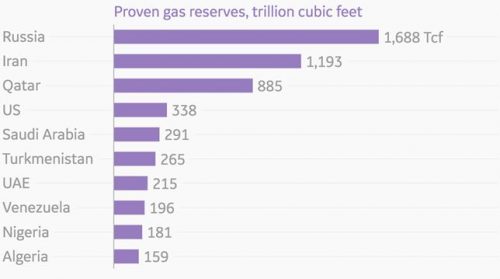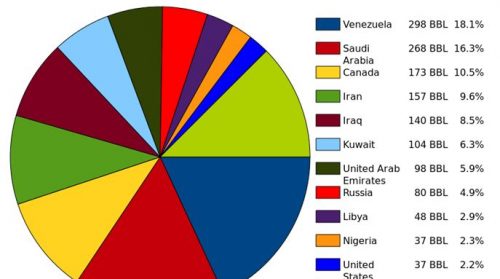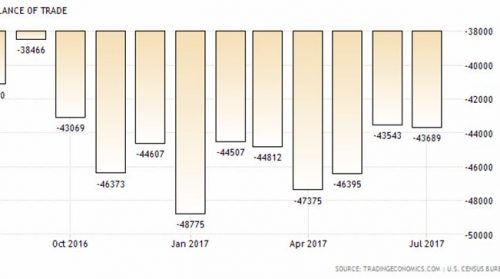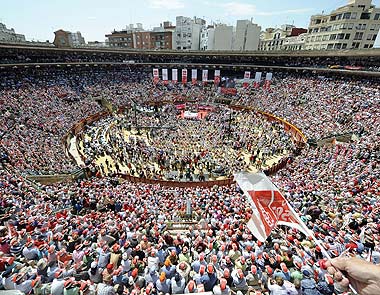Qatar, North Korea, the Baltic Sea, risk of a World War III… and all the military ranting mentioned in the media lately, are issues going hand in hand with the programmed and imminent advent of the catastrophic scenario for the dollar as a unique world reference currency: the Petro-Yuan will be in place at the end of the year. More than a petro-currency, it will be a petro-gas-gold-currency! The West is thus preparing to switch to total anachronism with this founding act of the 21st century multipolar world. 2014-2017: here we are, at the end of a three-year exacerbation period of tensions on all front lines (West against the rest of the world) and we are witnessing the up-coming end of the dollar’s reign over the world and over all financial systems and their related economic activities. Sanctions, blockades, proxy-wars, direct military threats…(Public
announcement / read for free)
The armies of the Almighty Dollar to the rescue of the US indebtedness-financing system
 The arrival of the petro-Yuan is of course the end of the dollar as a pillar of the international monetary system and thus the end of the unavoidability of the dollar, a national currency that the vagaries of history have led to support the global economy, which are currently too heavy for it. Since there is no longer an obligation to go through the US dollar in international transactions, the perception of the value of the US currency will radically change, to focus more on the reality of the solidity of the US economy , its production, its exportations... so many indicators currently in the red... (GEAB
117 / subscribe)
The arrival of the petro-Yuan is of course the end of the dollar as a pillar of the international monetary system and thus the end of the unavoidability of the dollar, a national currency that the vagaries of history have led to support the global economy, which are currently too heavy for it. Since there is no longer an obligation to go through the US dollar in international transactions, the perception of the value of the US currency will radically change, to focus more on the reality of the solidity of the US economy , its production, its exportations... so many indicators currently in the red... (GEAB
117 / subscribe)
Until 2019: The winner is the Cold War Scenario
 we estimate a continuation of the Cold War between the West and the rest of the world, until 2019 (the year of the next European elections), where the petro-Yans will allow the "Other World" to get organised without the West, in the context of a decoupling between economic and financial systems (probably rallying an open world) and a political system tempted to stay isolated (with movement of goods and capital, but not of people, in a way). The problem with Cold War strategies is that they require extraordinary diplomatic skills. Will the master-minds behind the multiplication of tensions on the western limes be up to those of the "great" era? ... It would be better to have a game which lasts not too long anyway...(GEAB
117 / subscribe)
we estimate a continuation of the Cold War between the West and the rest of the world, until 2019 (the year of the next European elections), where the petro-Yans will allow the "Other World" to get organised without the West, in the context of a decoupling between economic and financial systems (probably rallying an open world) and a political system tempted to stay isolated (with movement of goods and capital, but not of people, in a way). The problem with Cold War strategies is that they require extraordinary diplomatic skills. Will the master-minds behind the multiplication of tensions on the western limes be up to those of the "great" era? ... It would be better to have a game which lasts not too long anyway...(GEAB
117 / subscribe)
Germany, Austria, Catalonia ... some features of Europe's face in the aftermath of the 2019 EU Elections
 we will try to sketch out the landscape of a series of elections awaiting us until the end of 2017 (in chronological order). Each of these elections reflects the challenges facing Europe by 2019; challenges which come not just from national or regional voters. The success to reconcile voters' expectations, government bets and European citizens' needs will depend on the ability of EU political leaders to understand that fundamental debates for the future of Europe must be open to their level, the European level. But that is pure anticipation already... (GEAB
117 / subscribe)
we will try to sketch out the landscape of a series of elections awaiting us until the end of 2017 (in chronological order). Each of these elections reflects the challenges facing Europe by 2019; challenges which come not just from national or regional voters. The success to reconcile voters' expectations, government bets and European citizens' needs will depend on the ability of EU political leaders to understand that fundamental debates for the future of Europe must be open to their level, the European level. But that is pure anticipation already... (GEAB
117 / subscribe)
Germany, National elections, September 24, 2017: the Merkel insurance reassures the Germans and the world
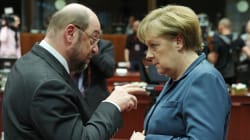 Here are the questions which worry the German electorate: education, old age, crime, terrorism, health, family, well-being ... We are, as you see, far from the debates on immigration, Europe, the euro and Turkey, topics imposed by the media and which are controversial. The Germans want specific answers to their expectations as to the political relevance of their management. The elections of September 24 will therefore be anything but ideal-political. So, no surprise that the CDU and Merkel are at the top of the polls with a very large advance for several months now, a steady advance with a voting intention rate of around 37%. People will never change a winning team ... (GEAB
117 / subscribe)
Here are the questions which worry the German electorate: education, old age, crime, terrorism, health, family, well-being ... We are, as you see, far from the debates on immigration, Europe, the euro and Turkey, topics imposed by the media and which are controversial. The Germans want specific answers to their expectations as to the political relevance of their management. The elections of September 24 will therefore be anything but ideal-political. So, no surprise that the CDU and Merkel are at the top of the polls with a very large advance for several months now, a steady advance with a voting intention rate of around 37%. People will never change a winning team ... (GEAB
117 / subscribe)
Catalonia, referendum on independence, October 1st, 2017: the EU is not the solution to the regionalisation issue
 On October 1st, the Catalan government organises a referendum on the independence of Catalonia, and two days later, on October 3rd, it intends to implement a "transition" plan towards independence. The Spanish Government is against this referendum and has called for the Spanish Constitutional Court, which agreed on the illegality of this electoral survey . In support of this decision, the Spanish government has ordered police, prefectures, civil guards, civil servants, including Catalan officials, to intervene to close the polling stations and to seize all the voting materials (ballot boxes, ballots, leaflets ...), to summon the secessionist mayors (there are more than 700, including the mayor of Barcelona supported by the Podemos party ) namely accusing the members of the Catalan government of "disobedience, prevarication and misappropriation of public funds "... (GEAB
117 / subscribe)
On October 1st, the Catalan government organises a referendum on the independence of Catalonia, and two days later, on October 3rd, it intends to implement a "transition" plan towards independence. The Spanish Government is against this referendum and has called for the Spanish Constitutional Court, which agreed on the illegality of this electoral survey . In support of this decision, the Spanish government has ordered police, prefectures, civil guards, civil servants, including Catalan officials, to intervene to close the polling stations and to seize all the voting materials (ballot boxes, ballots, leaflets ...), to summon the secessionist mayors (there are more than 700, including the mayor of Barcelona supported by the Podemos party ) namely accusing the members of the Catalan government of "disobedience, prevarication and misappropriation of public funds "... (GEAB
117 / subscribe)
Austria, national elections, October 15, 2017: the necessary progressive face lifting of political parties
 Who will be the new Austrian star? This is how the Standard journal qualifies the Chancellery race between the three candidates Kurz (ÖVP), Kern (SPÖ) and Strache (FPÖ) who manage to hide from view for the moment all the other political groups . Even the Greens, whose current president Van der Bellen is a member of the group, are in the backstage alongside NEOS and the Pilz list - they are not even sure that they have passed the 5%, knowing they managed a beautiful 12% in the last elections in 2013 . The media battle is one of the most important but also the most unequal components between large parties and small parties ... (GEAB
117 / subscribe)
Who will be the new Austrian star? This is how the Standard journal qualifies the Chancellery race between the three candidates Kurz (ÖVP), Kern (SPÖ) and Strache (FPÖ) who manage to hide from view for the moment all the other political groups . Even the Greens, whose current president Van der Bellen is a member of the group, are in the backstage alongside NEOS and the Pilz list - they are not even sure that they have passed the 5%, knowing they managed a beautiful 12% in the last elections in 2013 . The media battle is one of the most important but also the most unequal components between large parties and small parties ... (GEAB
117 / subscribe)
2018-2020, Airbnb and others: End of the gold rush, possible turning point
 The "peer-to-peer economy" has increased extensively and suffered transformations due to the development of giant commercial players such as Airbnb. The growth of this tourist property-renting website between individuals is indeed quite impressive. Despite this dizzying curve as well as the very promising future foreseen for the peer-to-peer economy, we anticipate that the gold rush is now a thing of the past for those companies and that their forecasts are far from being as flourishing as we might imagine... (GEAB
117 / subscribe)
The "peer-to-peer economy" has increased extensively and suffered transformations due to the development of giant commercial players such as Airbnb. The growth of this tourist property-renting website between individuals is indeed quite impressive. Despite this dizzying curve as well as the very promising future foreseen for the peer-to-peer economy, we anticipate that the gold rush is now a thing of the past for those companies and that their forecasts are far from being as flourishing as we might imagine... (GEAB
117 / subscribe)
Investments : Peer-to-peer economy vs Traditional Economy
 A few years ago or even recently it was particularly wise to invest in companies such as Airbnb or Leboncoin, but now we hope to have shown that it is not enough to extend the growth curves to forecast future profits out of these companies, including in the near future (like two or three years ahead). Although this choice may prove to be less profitable in the end, our experts believe that it is now less risky and wiser to invest in the "traditional" economy (we mentioned Booking.com in the article, for example), the time to observe if the above-mentioned business know how to painlessly transform themselves in order to pass the knee-point (or even the u-turn) they will have to face... (GEAB
117 / subscribe)
A few years ago or even recently it was particularly wise to invest in companies such as Airbnb or Leboncoin, but now we hope to have shown that it is not enough to extend the growth curves to forecast future profits out of these companies, including in the near future (like two or three years ahead). Although this choice may prove to be less profitable in the end, our experts believe that it is now less risky and wiser to invest in the "traditional" economy (we mentioned Booking.com in the article, for example), the time to observe if the above-mentioned business know how to painlessly transform themselves in order to pass the knee-point (or even the u-turn) they will have to face... (GEAB
117 / subscribe)
Sponsor a student in 2017 (GEAB promotional offer)
 The LEAP laboratory invites all GEAB subscribers to sponsor a student and offer them a free academic year subscription to the GEAB bulletin! The academic year is always synonymous with the welcoming of new university students. Do you believe in the importance to support students with their professional integration? Should you know a specific student around you who needs geopolitical and economic references, we invite you to become a sponsor. This 1+1 subscription offer is valid from September 1st, for the entire university year so we invite readers who have not yet subscribed or renewed to do so now here in order to allow the selected student to receive all of this year’s bulletins for free ... (Subscribe
and become a sponsor)
The LEAP laboratory invites all GEAB subscribers to sponsor a student and offer them a free academic year subscription to the GEAB bulletin! The academic year is always synonymous with the welcoming of new university students. Do you believe in the importance to support students with their professional integration? Should you know a specific student around you who needs geopolitical and economic references, we invite you to become a sponsor. This 1+1 subscription offer is valid from September 1st, for the entire university year so we invite readers who have not yet subscribed or renewed to do so now here in order to allow the selected student to receive all of this year’s bulletins for free ... (Subscribe
and become a sponsor)

